|
Royal Parade
Ramsgate
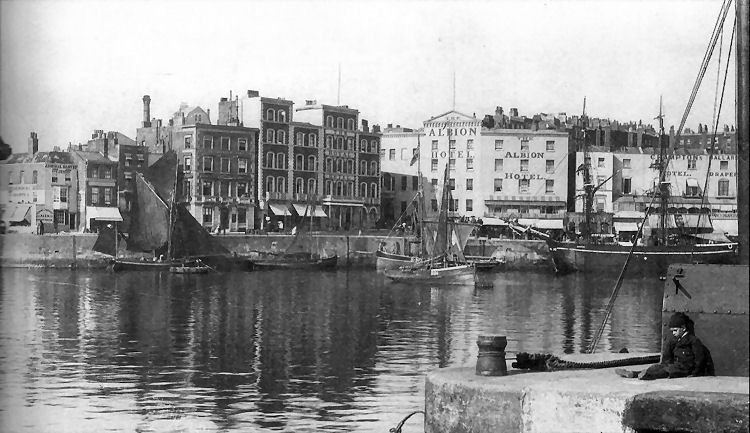
Above photo, pre 1897. Showing the from left to right the "Admiral
Harvey," Royal Clarence Baths, "Royal Hotel," "Albion Hotel," National
provincial Bank and "Crampton's Hotel." |
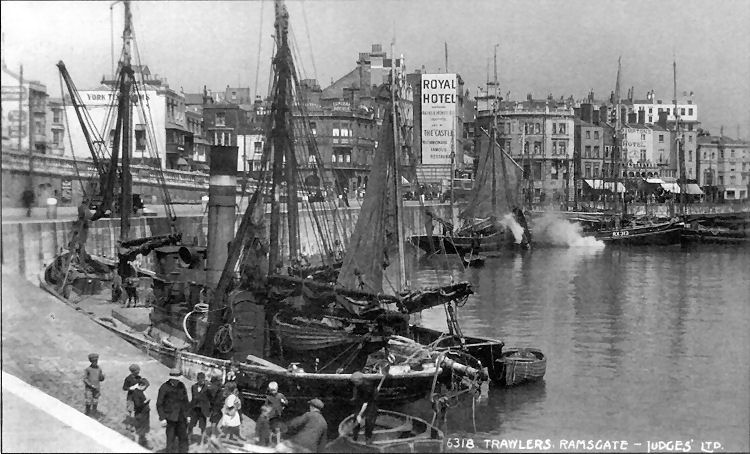
Above photo 1920. |

Above postcard, date unknown. |

Above postcard, circa 1908. By kind permission of Kent Photo Archives. |
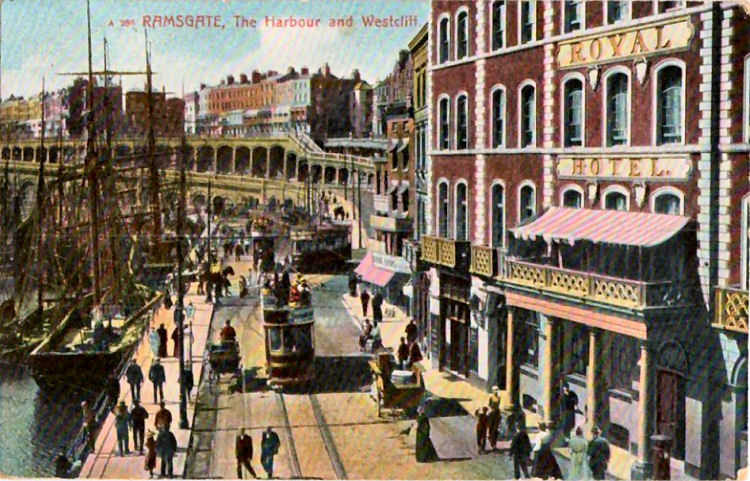
Above postcard, 1908, kindly sent by Rory Kehoe. Very similar to the one above. |
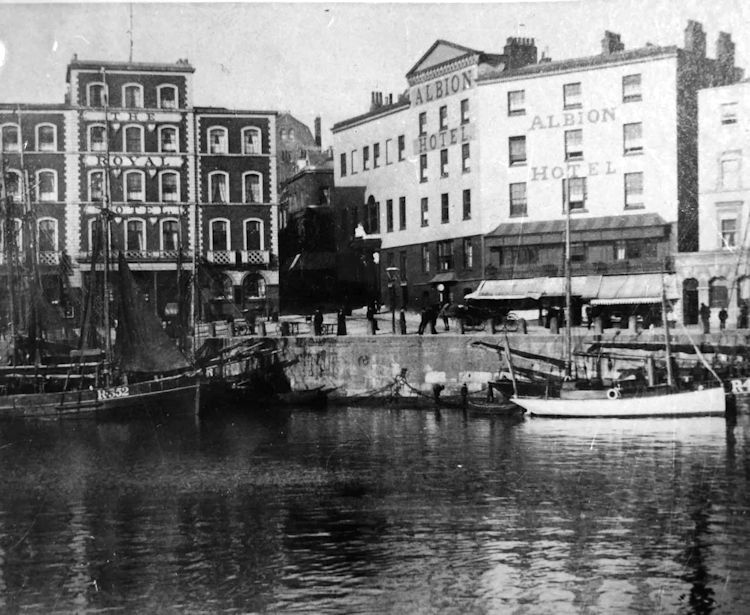
Above photo, date unknown. |

Above photo, date unknown. |
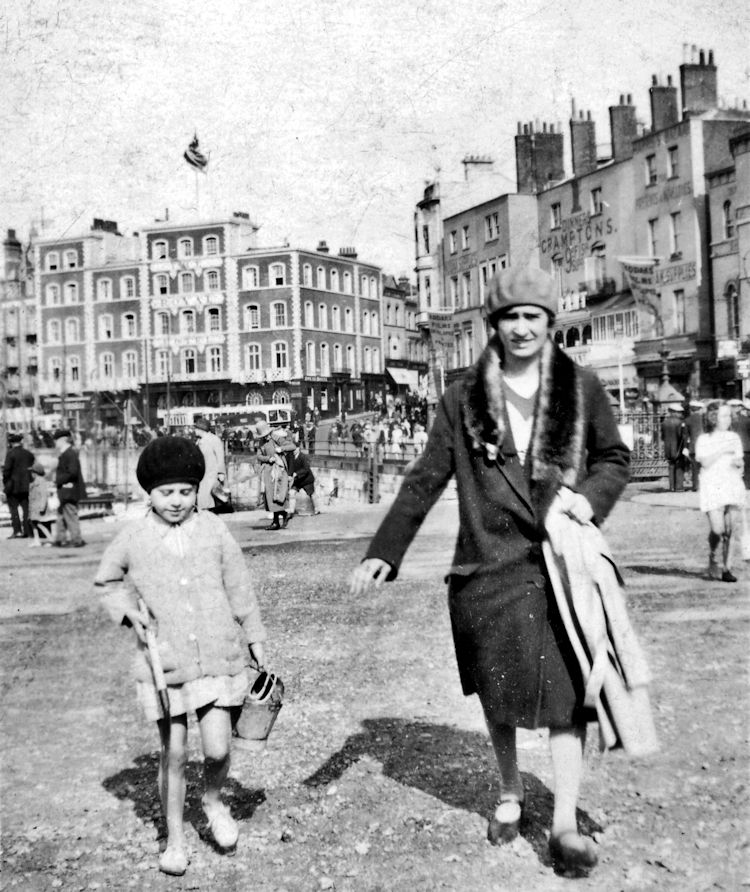
Above photo, circa 1928, showing Gladys Mary Bird and her mother Gladys
Maud Bird, the relations of John Pett who kindly sent this photo. |
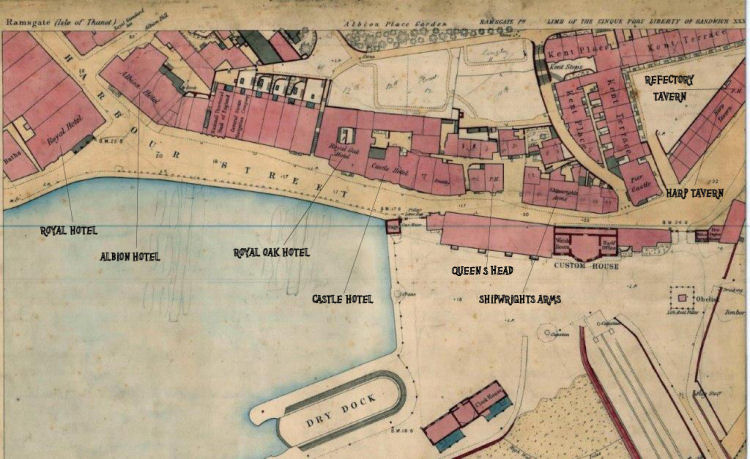
Above map, 1849, kindly sent by Bob Lee. |
Most of the buildings above were demolished in 1893 to make way for the
road improvements and access to the East Cliff. However, the "Royal Hotel"
was spared but eventually was replaced for a new building in March 1938.
|
From the Kentish Gazette, 18 February 1840.
Ramsgate.
(The following was in response to Queen Victoria's recent marriage to
Prince Albert on 10 February 1840. Paul Skelton.)
The principal tradesmen suspended business and closed their shops, that
all classes might join in the festive hilarity. About 200 children were
feasted at the National School Rooms; 150 of the Teetotal Society took
tea at Hubbard’s Rooms, and discussed the subject of the joys of
matrimony; and 56 tradesmen sat down to a sumptuous dinner at Corbin's
"Royal Oak Inn," served up in capital style, and worthy of the
auspicious occasion. About 120 of the inhabitants and their daughters
partook of a supper at Hiscock’s "Royal Hotel," after which they joined
in the "graceful dance." Nearly 100 persons of the principal resident
nobility and gentry were similarly engaged at Bear’s "Albion Hotel,"
keeping up the ball till near daylight. The poor at the Union were
regaled with roastbeef, plum pudding, and beer, so that nearly the whole
of the inhabitants did honour to the illustrious bride and bridegroom.
|
|
From the Kentish Gazette, 7 April 1840.
RAMSGATE CATCH CLUB.
The last concert for the season took place on Thursday, at the "Royal
Oak Inn," when the room was well filled; the concert was excellent. The
club has for some time been nearly £60 in debt, but much to the surprise
of the company, Mr. Potlock, in the course of the evening, announced
that he had collected upwards of £40 towards its liquidation.
|
|
The Morning Post (London, England), Tuesday, August 09, 1842; pg. 8; Issue 22326.
MARRIED.
On the 3rd inst, at St. George's, Ramsgate, by the Rev. J. Davies, Henry
James Compton, Esq., eldest son of J. Compton, Esq., of Finchley,
Middlesex, to Emma, second daughter of Captain Corbin, of the Fame
steam-packet, and the "Royal Hotel," Ramsgate.
|
|
Canterbury Journal, Kentish Times and Farmers' Gazette, 20 July, 1844.
DEATHS.
On the 12th inst., at Ramsgate, Sarah, the wife of Mr. B. T. Hiscocks,
of the "Royal Hotel," aged 34.
|
|
Kent Herald, 13 March 1845.
Marriage.
Mar 6, at Westbury-on-Trym, Gloucestershire, Mr. R. T. Hiscocks, of the "Royal
Hotel," Ramsgate, to Louisa, daughter of the late William Grainger, esq.,
surveyor of her Majesty's Customs, Bristol.
|
|
From the Kentish Gazette, 28 October 1845.
DEATH.
Hiscocks:— Oct. 14, at Ramsgate, Mr. Zachariah Hiscocks, late of the
"Royal Hotel," aged 66.
|
|
Southeastern Gazette, 13 September 1853.
TUESDAY. (Beforc A. Crofton, Esq., Hon. H. S. Law, Rev. G. W.
Sickleraore, Captain George, and Dr. Canham).
The hall on this occasion was much, crowded. No less than 14
informations had been exhibited against as many hotel-keepers and
innkeepers, for opening their houses for the sale of excisable
liquors (otherwise than as refreshments for travellers), before
half-past twelve on Sunday, the 21st and 28th ult. Mr. Child (of the
firm of Wire and Child) St. Swithin’s-lane, appeared for the
complainant, John Nicholls, and Mr. M. L. Daniel for the proprietors
of the "Royal Hotel."
Mr. Child, in opening the case, admitted that the information were
instituted by Mr. Brand, who, it will be remembered, was himself a
short time back singled out (cruelly as he thought), and fined 15s.
and costs, for this very offence. His client had hoped that the
parish authorities or the police would have carried out the
intimation made by the bench; they had not done so, therefore his
client had thought it incumbent upon him to do so. His object was
not to press for penalties, but to get a solemn decision of this
bench that the statute should no longer be inoperative in the town.
The defence could not be that hotel-keepers were not liable to the
penalties of the Act; they were equally liable with the humblest
publican if they infringed the law; at the same time he would admit
that persons bona fide residents in and using the hotel for its
purposes were entitled to be served.
The first case gone into was against the Messrs. Hiscock,
proprietors of the "Royal Hotel," which has recently been vacated by
the ex-royal family of France.
John Nicholls deposed that he was an engineer, and had resided
during the last few months at the "Refectory." On Sunday, the 28th
August, he and another person went to the "Royal Hotel" at eleven
minutes after eleven, and called for two glasses of sherry. They
were shewn up the coffee-room, where they paid for and drank it.
There were several other persons in the house.
Henry Desmoulins corroborated the above witness, and was
cross-examined by Mr. Daniel as to his name, whether he was the
person who in an hand-bill recently circulated was designated as
Glover. Witness admitted that the former was a name he assumed
professionally, and by which he was better known in this town.
Mr. Daniels then addressed the Bench for the defendants, contending
that they could not come to an adverse judgment for his client. If
so it would be a great injustice to them, seeing that before the
hour of eleven in the forenoon there were not less than six trains
arriving here, the travellers by which must rise early. The learned
gentleman then went into a lengthened argument on the subject of
what constituted "a traveller."
The magistrates, retired, and on their return the Chairman said that
they had given the case their full consideration, and looking
strictly to the word "traveller," and what constituted a traveller
within the meaning of the statute, they could not, without straining
it to a length beyond the meaning of the Act, acquit the defendants.
They had therefore unanimously agreed to their judgment, which was
that the defendants pay a fine of 15s. and 16s. costs. Mr. Hiscock
remarked that they had done all in their power to comply with the
law, as they entirely closed from Saturday night to Monday the
retail department of their establishment.
|
|
Kentish Gazette, 17 January 1854.
POLICE COURT. MONDAY.
(Beford the Hon. J. S. Laws, J. A. Warre, Dr. Canham, W. H. S. George,
Shuan Storey, and Henry Kenton, Esqrs.)
Charles Hutchins, greengrocer, Harbour street. was brought before the
Court for the ninth time, charged by Messrs.
Hiscocks, of the "Royal King’s Head Hotel," Ramsgate, with wilfully
breaking one square of glass.
Prisoner pleaded guilty.
The worthy magistrates remanded him till this day week to Sandwich gaol,
to admit of time to communicate with the Home
Secretary at to what was to be done with him.
|
|
From the Kentish Gazette, 22 September 1857.
PETTY SESSIONS. Monday.
James Willis was charged with stealing on the 23rd ult., an
overcoat, pair of leggings, and goloshes, the property of Mr.
Snowden.
It appeared that in the month of June last prisoner was head porter
at the "Royal Hotel," at which house Mr. A. Fowler was staying
previous to his marriage with prosecutor’s daughter. On returning to
the hotel one wet night from Mr. Snowden’s house, he borrowed the
articles mentioned, which, on his getting to the hotel, he handed to
the prisoner. Mr. Fowler afterwards inadvertently left the hotel
without returning the articles borrowed, and which were not missed
until they were wanted during the late wet weather; on inquiry at
the hotel they were found to be non est, (he is not found) as also
the prisoner, who had left his place. The prosecutor having learned
that he was at Deal, proceeded there, and having procured a search
warrant, went to his lodgings, where were found the shoes.
Subsequently the coat was found in his possession.
Prisoner pleaded not guilty, and said that a person who occupied No.
9, in the house, at the time mentioned, gave them to him, on his
(the gentleman’s) leaving.
He was committed for trial at the Sandwich Quarter Sessions, but
admitted to bail.
|
|
From the Kentish Chronicle, 19 November 1859.
PETTY SESSIONS.
Jane Lewis, kitchen-maid at Hiscock's Royal Hotel, was charged with
beating and assaulting Joseph Pickering, a waiter in the same
establishment. It appeared that Pickering having ventured into the
domain of the cook in search of milk, she sternly forbade his approach,
and on his resistance, seized him by the hair of his head and
administered sundry boxes on the ears of the intruder. Some of the
dislodged hair was produced in court in proof of the cook's violence.
The prisoner, in defence, said "Plaintiff had no business in her
department, and that he should not come to her table."
Fined 6s., and 10s. 6d. costs, in default to be committed to Sandwich
gaol for seven days.
Defendant very reluctantly paid the money and was discharged.
|
|
From the Maidstone Telegraph, Rochester and Chatham Gazette, 5 October 1861.
Ramsgate. Shocking death.
On Sunday afternoon Captain Durrant was suffocated in a dyke, in the
marshes adjoining the Sandwich Road. We have not been able to ascertain
the whole of the circumstances attending the gentleman's sad end. It
appears, however, that he arrived at Ramsgate from Herne Bay, on
Saturday, and put up at the "Royal Hotel." On Saturday morning he was
seen on the Ramsgate Sands, apparently very much the worse for liquor.
He was walking up to his knees in the water with his boots on. He then
returned to the hotel, changed his boots, and proceeded to the Roman
Catholic Chapel, where his conduct was such as to cause great annoyance
to the congregation, and he was forcibly ejected. He subsequently hired
a boy and pony chaise to take him for a drive. After proceeding to the
Salt Ponds, on the Sandwich Road, he left the chaise in care of the boy
and set off on a ramble among the dykes. Nothing appears to be known of
his subsequent movements, except that some time afterwards he was found
in a dyke.
Go to
Inquest.
|
|
From the Kentish Chronicle and General Advertiser, 5
October, 1861. Price 1 1/2d.
DEATH OF CAPTAIN DURANT AT RAMSGATE.
On Sunday afternoon Captain Durant was suffocated in a dike, in the
marshes adjoining the Sandwich road. It appears that he arrived at
Ramsgate from Herne Bay on Saturday, and put up at the “Royal Hotel.” On
Sunday morning he was seen on the Ramsgate sands, apparently very much
the worse for liquor. He was walking up to his knees in the water with
his boots on. He then returned to the hotel, changed his boots, and
proceeded to the Roman Catholic chapel, where his conduct was such as to
cause great annoyance to the congregation, and he was forcibly ejected.
Subsequently he hired a boy and pony chaise to take him for a drive.
After proceeding to the Salt Pond on the Sandwich road, he left the
chaise in the care of the boy and set off on a ramble among the dikes.
Nothing appears to be known of his subsequent movements, except that
some time afterwards he was found dead in a dike.
An inquest was held on the body on Tuesday last at the “Red
Lion,” Minster, before T. T. Delasaux, Esq., the coroner, when the
following witnesses were examined:—
Stephen West, labourer, living in the parish of Stonar, said:— On
Sunday last, at about four o'clock in the afternoon, I was on the sea
wall, and saw the deceased come over the sea wall and go towards the
river Stour; and he shortly afterwards came back and fetched a white dog
(which I have this day seen), and which he took in his arms, and went
again towards the river. As I saw nothing again of the deceased, I went
in search of him, and having procured some drags, I found the body of
the deceased in the water. He was then quite dead. It did not appear to
me that he had accidentally fallen into the water, but I believe he
threw himself in. The shoes of the deceased were found on the shore
about six yards from the spot when his body was found.
Charles Rogers, fisherman in the parish of Stonar, confirmed the
evidence of the last witness.
George Watts, a labourer, living in Ramsgate, said that on Sunday
last he drove the deceased to Margate in a pony chaise, he returned and
took him to the Sands, where he bathed. Shortly after he drove him to
the Catholic Chapel, and left him there, calling for him, by his orders,
when the services was over. Subsequently he took him to the “Royal
Hotel,” Ramsgate, where witness believed he was staying. He afterwards
drove the deceased to Pegwell Bay, and then to the Bridge, in the parish
of Minster, where he set him down. He remained there half an hour, and
saw the deceased jump over a ditch after some bullocks, he told witness
several times to return home, and he did so. Deceased was not sober when
he left him, and on the road he had drunk gin and ale at two houses.
Thomas Noakes, Sergeant K.C.C., stationed at Minster, said that he
searched the body of the deceased when it was taken out of the water,
and he found a gold watch, chain, and seal, two gold rings, and 1s. 6d.
in silver and copper.
Mr. R. T. Hiscock said that he kept the “Royal Hotel,” Ramsgate. The
deceased was an inmate of his house. He came there on Saturday, with his
wife. Witness had known him for the last two years. He appeared to be in
an excited state when he saw him on Saturday. He believed that he had
been confined in a Lunatic Asylum in France.
The Coroner briefly addressed the Jury, who returned a verdict of
“Accidentally Drowned.”
|
|
From the Thanet Advertiser, Tuesday 21 February 1939.
New Hotel for Old. Royal Transformation Turning a page in Ramsgate history.
Have a good look at the small pile of masonry standing at the seafront
corner of Harbour Street, Ramsgate, for it is the last you will see of
one of the towns most famous hotels.
Behind it the new "Royal Hotel," an attractive building, with every
convenience that modern requirements demand, makes a fine picture and is
another milestone in the amenities of Ramsgate for catering for visitors
and residents.
The "Royal Hotel" has been the pivot around which Ramsgate has grown
during the past 250 years and probably few sites are more wrapped up
with a history of the town.
Originally, the "Royal Hotel" was a coffee house known as the "King's
Head" and it probably existed in some form as far back as the 17th
century. Later became licensed and was known as the "Kings Head Tavern"
in 1717. In those days it was the Town Quay at which the sailing packets
and hoys received and discharged their cargoes before the erection of
the Harbour.
From its windows in the early days could be seen the troops embarking
for the Napoleonic Wars, the convict ships bound for the other side of
the world and the embarkation and return of King George IV in 1821. It
was by Royal warrant that the name "Kings Head" was changed to "Royal
Hotel" after the monarch's visit. The "Royal Arms," in fact, used to
stand outside the hotel up to the Great War.
Although in recent years the "Royal Hotel" underwent extensive
redecoration and modernisation it still fell short of the present-day
requirements and at long last it was decided that the famous building
must go.
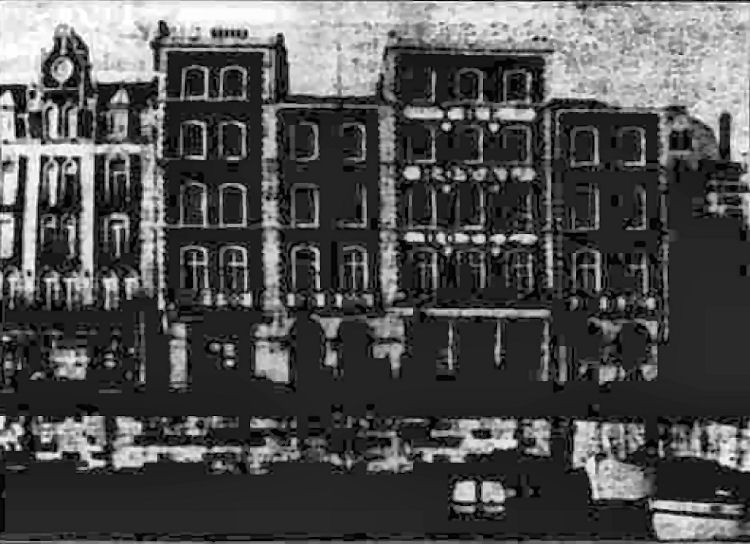
Above photo showing the Old Royal, photographed from the crosswall of
the Harbour.
In March, 1938, the demolition work began and the new hotel which has
arisen phoenix-like on the corner site began to take shape.
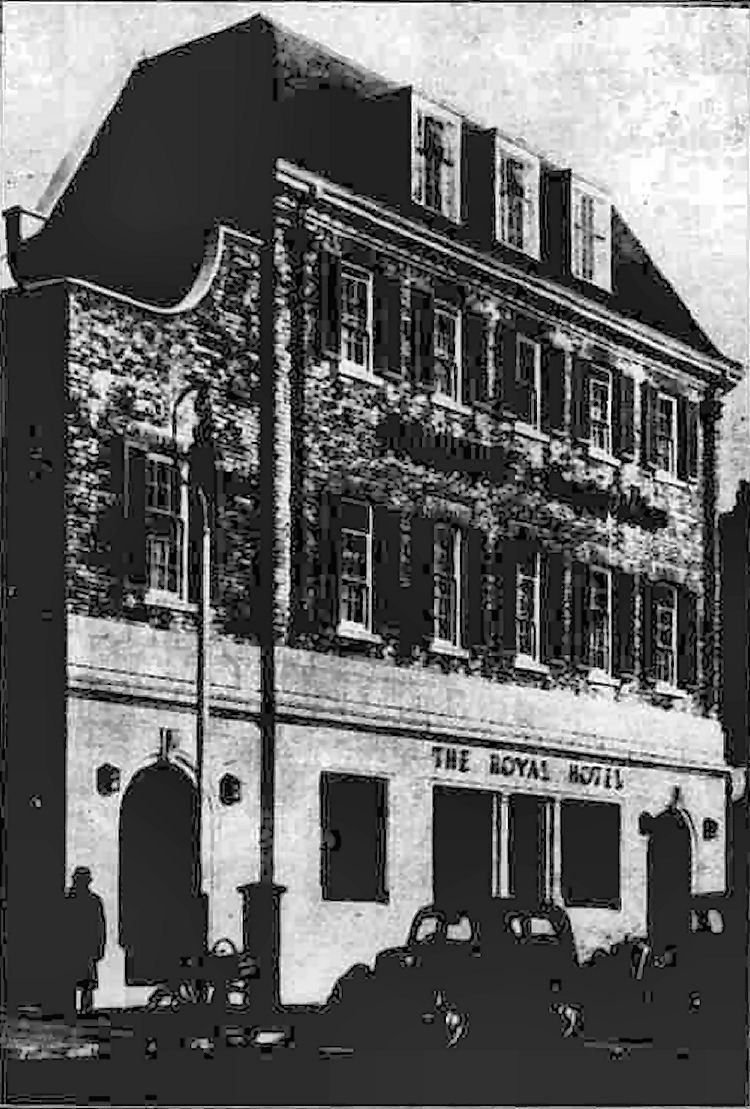
Above photo showing the fascia of the New Royal Hotel.
An Advertiser and Echo representative was conducted over the new
premises by Mr. W. Stoner, who has supervised the building work for
Messrs. Hall, Bebball and Co., of London, during the week.
First let us go down into the cellars, where Messrs. William Younger and
Co., the famous Scottish brewers, have spared no effort to make sure
that the hotel's customers may receive their refreshments in ideal
condition. The whole of the pipe arrangements for draught beer are
executed in stainless steel, while there is ample storage for every type
of wine, spirit and ale.
The seller is fitted with an automatic air circulating and cooling
system which ensures that the beers shall be delivered at the same
temperature all the year round. Should the seller become too cold,
heaters come into action, and should the temperature rise above the set
level, cool air will force it down to the point required.
So much for the cellars.
The ground floor consists of four light and spacious bars - saloon,
cabin, public and a large lounge. The bars themselves are carried out in
oak panelling into which have been set attractive decorative panels of
various Scottish tartans. The furnishing, too, is of sturdy and
comfortable design. Ample cloakroom and toilet accommodation is
provided.
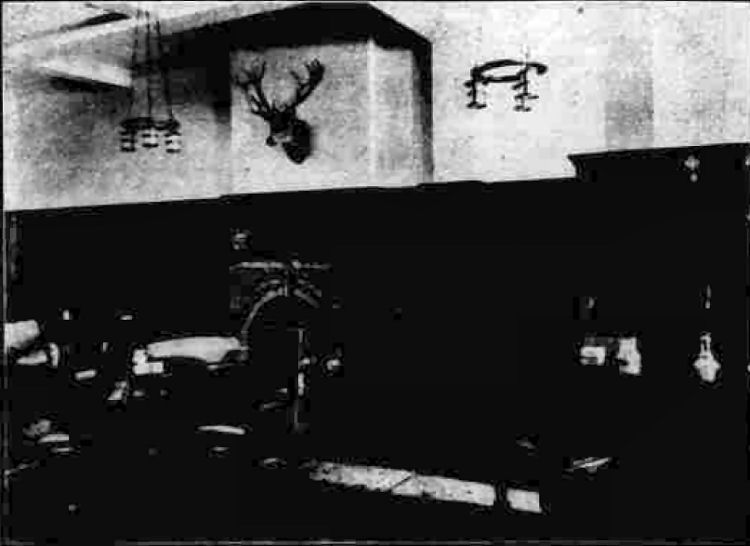
Above photo showing a corner of the comfortable saloon lounge.
Nearly the whole of the first floor is taken up by spacious restaurants
in which 150 people will be able to dine in comfort. Suitable for club
dinners and outing parties, the room is easily convertible for meetings,
concerts, and dances. On the same floor or up-to-date kitchens in which
gas cookers play a large part and from which meals are served to those
in the dining hall by means of dispensing hatches. A goods lift connect
the floors.
Living accommodation for the tenant is situated on the second floor,
while on the top floor there are a number of bedrooms, each fitted with
hot and cold water, and, commanding an excellent view. Bathroom and
toilet accommodation are, of course, also provided.
The outside of the building is of pleasing design with a strong tendency
towards Georgian in style. The lower portion of the building is faced
with glazed terra-cotta and the other portion carried out in red brick
with delightful green shuttering to all windows.
All floors in the new building are fireproof.
The construction of the new "Royal Hotel" has led to a great improvement
at the seafront corner of Harbour Street, which was formerly "blind,"
and consequent widening and improvement of the roadway and pavement
overlooking the harbour.
Altogether the new "Royal Hotel" is another valuable link in the chain
of improvements which is steadily earning for Ramsgate the name of the
most up-to-date town on the southeast. |
LICENSEE LIST
HISCOCKS Zachariah 1841-14/Oct/1845 dec'd age 66 (age 60 in 1841 ) )
HISCOCKS Bedford & Robert 1844-67+ (Royal Hotel or Kings Head)
HISCOCKS Robert T 1861-62+ (age 49 in 1861 ) )
HISCOCKS Bedford N & Samuel W (son) 1871-81 (age 60 & 27 in 1871 ) )
ROACH James Joseph 1891-1903+
BATHGATE J M 1938+
https://pubwiki.co.uk/RoyalHotel.shtml
 Census Census
|










